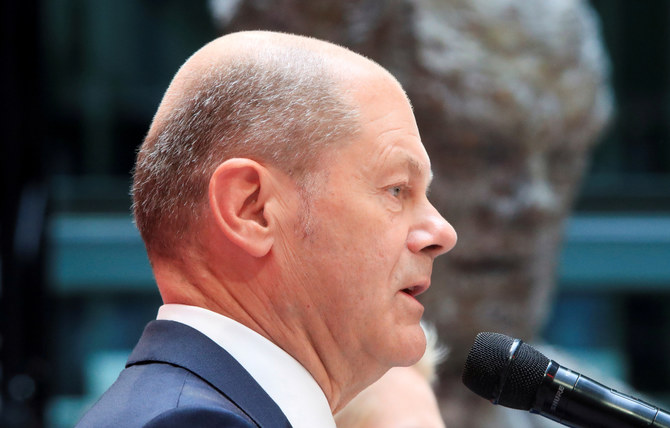BERLIN: The party that narrowly beat outgoing German Chancellor Angela Merkel’s bloc pushed Monday for a quick agreement on a coalition government amid concerns that Europe’s biggest economy could be in for weeks of uncertainty after an election that failed to set a clear direction.
Olaf Scholz, the candidate of the center-left Social Democrats, called for Merkel’s center-right Union bloc to go into opposition after it saw its worst-ever result in a national election. Both finished with well under 30 percent of the vote, and that appeared to put the keys to power in the hands of two opposition parties — raising questions over the stability of a future government.
During her 16 years in office, Merkel was seen abroad not just as Germany’s leader but in many ways as the leader of Europe, helping steer the European Union through a series of financial and political crises.
The unclear result combined with an upcoming French presidential election in April creates uncertainty — at least for now — in the two economic and political powers at the center of the EU, just as the bloc faces a resurgent Russia and increasing questions about its future from populist leaders in eastern countries.
Both outgoing finance minister and Vice Chancellor Scholz and Armin Laschet, the Union’s candidate and governor of North Rhine-Westphalia state, staked a claim to leading the new government on Sunday night. Scholz, who pulled his party out of a long poll slump, sounded confident on Monday.
But the kingmakers are likely to be two prospective junior partners in any coalition, the environmentalist Greens and the business-friendly Free Democrats. The Greens traditionally lean toward the Social Democrats and the Free Democrats toward the Union, but neither ruled out going the other way on Sunday night.
“Voters have spoken very clearly,” Scholz said Monday. “They strengthened three parties — the Social Democrats, the Greens and the Free Democrats — so this is the visible mandate the citizens of this country have given: These three parties should lead the next government.”
The only other option that would have a parliamentary majority is a repeat of the outgoing “grand coalition” of the Union and Social Democrats. That is the combination that has run Germany for 12 years of Merkel’s 16-year tenure, though this time it would be under Scholz’s leadership with Merkel’s bloc as junior partner. But that coalition has often been marred by squabbling, and there is little appetite for it.
Scholz and others were keen to dispel concerns that lengthy haggling and a new, multiparty government would mean unstable leadership in Europe’s biggest economy.
“My idea is that we will be very fast in getting a result for this government, and it should be before Christmas if possible,” Scholz told reporters in Berlin. “Germany always has coalition governments and it was always stable.”
Scholz, an experienced and pragmatic politician whose calm, no-frills style is in some ways reminiscent of Merkel’s, pointed to continuity in foreign policy. He said a priority will be “to form a stronger and more sovereign European Union.”
“But doing so means also to work very hard on the good relationship between ... the European Union and the United States,” he added. “The trans-Atlantic partnership is of (the) essence for us in Germany ... and so you can rely on continuity in this question.”
The Greens made significant gains in the election to finish third but fell far short of their original aim of taking the chancellery, while the Free Democrats improved slightly on a good result from 2017.
Merkel’s outgoing government will remain in office until a successor is sworn in, a process that can take weeks or even months. Merkel announced in 2018 that she wouldn’t seek a fifth term.
Scholz was clear that her party should bow out of government. He said the Union “received the message from citizens that they should no longer be in government, but go into opposition.”
Amid concern about rising nationalism and populism, the Europeans will be reassured that mainstream parties will form the next government. Sunday’s election saw weaker results for the far-right Alternative for Germany and, at the other end of the spectrum, the Left Party. The strong showing by the Greens could also help ease passage of the EU’s landmark “Fit for 55” climate change package aimed at making the 27-nation bloc carbon neutral within 30 years.














